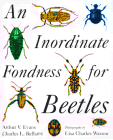Cataloguing species
 Many students are surprised to find that there is no central record keeping body for species in the same way that there is for, say, Astronomical bodies. It isn't that the magnitude of the task is that much different - the Catalogue astrographique (Astrographic Catalogue) for example lists over 4.6 million stars.
Many students are surprised to find that there is no central record keeping body for species in the same way that there is for, say, Astronomical bodies. It isn't that the magnitude of the task is that much different - the Catalogue astrographique (Astrographic Catalogue) for example lists over 4.6 million stars.Fortunately there is now an attempt, Species 2000, to centralize species listings into a single database. The task is large but the sixth (2006) edition of the Annual Checklist, contains 884,552 species, approximately half of all known organisms. Species 2000 is a "federation" of database organizations working closely with users, taxonomists and sponsoring agencies. The goal of the Species 2000 project is to create a validated checklist of all the world's species by bringing together an array of global species databases covering each of the major groups of organisms.
Labels: Biodiversity


